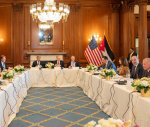You are here
The Chilcot report
Jul 12,2016 - Last updated at Jul 12,2016
The Chilcot inquiry into the Iraq war and Tony Blair’s decision to join the US-led coalition and take the UK to war in Iraq in 2003 published its long-awaited and damning, and final, 2.6-million word report on July 6, 2016.
Many commentators, however, believe the Chilcot report may not have added much to what was already well known. I tend to agree with this viewpoint.
We knew right from the beginning that the decision to wage war on Iraq was totally disconnected from any “justifying” intelligence.
Fake “evidence” had to be invented to justify the decision, and it was.
Although hardy convincing and often miserably flawed, the Blair government’s insistence that Iraq possessed weapons of mass destruction which threatened the world was circulated and pressed through unchallenged.
The key points set out in the Chilcot report are that Blair deliberately exaggerated the threat posed by Saddam Hussein and that the UK chose military action before having exhausted all other diplomatic and peaceful options; British intelligence produced flawed information that went unverified and unchallenged.
The report states that the British military was poorly prepared for such a war.
Blair, ignored warnings, kept his Cabinet in the dark and had no plans for post-war Iraq.
The report also questions the legal grounds on which the British decision to join that war was made without UN approval, and found that UK’s actions had “undermined” the authority of the UN Security Council.
Blair insists that there was no evidence in the report of deliberate “deceit” and “dishonesty” on his part, but has failed to explain how the invasion of a foreign country that posed no threat to the UK, on the basis of deliberately fabricated pretexts, could not be dishonest.
And by telling US president George Bush that “I will be with you whatever” and “act now, explain later”, Blair clearly strived to share the ignoble glory of that disastrous adventure, unmindful of the lives of either the innocent British soldiers who were pushed into the mad war or the Iraqi citizens and their homeland.
The Chilcot report, incriminating as it is, is not and should not be the final word on a war that left perpetual disasters.
It is an internal British report that may now allow families to seek private prosecutions against the former prime minster.
However, still needed is a bold and independent international investigation with powers to determine responsibilities, verify war crimes and demand legal accountability.
There are well-documented cases of serious atrocities, torture, detentions, attacks on civilians and more.
How could anyone forget the Abu Ghraib prison scandal where Iraqi prisoners were abused and tortured by bored soldiers in manners that would have been criminalised if perpetrated against animals?
Where is the International Criminal Court in relation to this immense international crime?
Whether Blair’s war decision was made in good faith, as he claims, or out of outright political opportunism and vicious vested interests, as the many victims of the war believe, and indeed many others, makes little difference; all those who were affected by the consequences are entitled to damages and reparations: individuals, families and states.
The war did not only remove Saddam Hussein from power. It dismantled the state of Iraq, pushing what was left of it into eternal carnage and chaos, clearly as was originally planned.
We still do not know the exact figure of the dead Iraqis, but most conservative estimates speak of close to half-a-million.
Many other millions were scattered across the world aimlessly. The entire Iraqi society was fragmented beyond any foreseeable possibility of rehabilitation.
A dictator was indeed removed and publicly hanged, but he was replaced by a corrupt and an incompetent government, a failed state, sectarian terror – a far cry from the model democracy Western “liberators” had promised to deliver.
As I write, updated news reports of last week’s terrorist attack in a crowded shopping area in the Karradah quarter of Baghdad speak of 292 deaths and many hundreds of injuries. This, in one attack only.
Another attack a few days after on a Shiite mosque in Balad, north of Baghdad, left 35 dead and dozens injured.
No amount of apologies or acknowledgement of responsibility is enough for the Iraqis or for the British families who lost their loved ones in reckless politicians’ adventurism and erratic warmongering.
It certainly should not be enough for the simplest requirements of international justice.
What business was it of Blair to liberate the Iraqi people from a dictator? Was Saddam Hussein the only one?
And if he posed any threat to his neighbours or if he was sponsoring terror — Blair’s rationalisation — did he ever constitute any threat to Britain and its people?
Regardless of how abnormal the Iraqi dictatorial rule was considered, the truth is that Iraq was completely and totally free of terrorists under the dictatorship.
Iraq was by no means a utopia, but it was definitely a safe place of law and order where the state provided all the services citizens needed.
Iraq, then, was a balancing and stabilising factor in a region hit by war and conflict for decades.
One just has to look at the instability in the region today and see how that war handed Iraq over, on a silver platter, to all brands of terrorists and terrorist organisations, which have not only managed to establish bases and take control of huge areas in Iraq, Syria, Yemen, Libya, Nigeria and Somalia, but are also attacking capitals and indiscriminately killing innocent people in countries as far and wide as the US, Australia, Bangladesh, France, Turkey, Belgium, the UK, Jordan, Saudi Arabia, Lebanon and many other places.
Is the post-Saddam Middle East better off, as Blair says?
Nobody in his right mind would challenge the harsh reality that it is indeed much worse and much more dangerous.
In a telling account, Ian Black, Middle East editor at The Guardian (July 7) surveys the current Middle East situation and comes up with a totally different findings: a rise in global terrorism; the prominence of the Iranian role in Iraq and the region; the Arab Spring and the toppling of regimes in Egypt, Libya, Yemen and Tunisia; the five-year raging war in Syria; the blockage of any hope of progress with respect to the Palestinian-Israeli peace talks; and the declining standing of the US in the Arab world.
The 2003 war on Iraq, the way it was started, its hidden objectives, Israel’s role in it as represented by the influential neoconservative lobby in Washington, the way the war was conducted, the dismantling of the Iraqi state, the introduction of sectarian-based power sharing and the disbanding of the Iraqi army plunged the region into a total anarchy that is still gathering force and madly surging ahead.
It is not surprising that some comments in Arab newspapers recalled the dark pages of historic British responsibility in producing the Arab world that exists today.
In addition to the recent wars on Iraq (1991 and 2003), they cite the Anglo-French Sykes-Picot agreement of 1916 that secretly, behind the back of the regions’ population, partitioned the land in accordance with British and French colonial interests and schemes; the Balfour Declaration of 1917 that designated Palestine as a national home for the Jews at the expense of the native Palestinian people who are, to this day, living with the consequences and trying to mend the deep wounds of the resulting catastrophe; the 1956 Suez war (led by Britain joined by France and Israel) against Egypt in retaliation for the nationalisation of the Suez Canal company, a classic condescending colonial adventure meant to discipline former subjects’ rebellious trends and disobedience of their colonial masters.
This is indeed a dark history.
The haste and enthusiasm with which some Western leaders take their decisions to attack an Arab or a Muslim country could not but raise serious questions about deeply anchored and often blind hatred guiding them.
Most contradictorily, when dealing with the decades-long Israeli occupation and constant aggression, we are advised that we should only talk and take diplomatic measures, rather than ever contemplate violence.
How ironic and hypocritical it is that the people who offer such wise and pacific advice are the very same people who rushed to wage two major wars on Iraq in a span of 10 years, bombed Khartoum in Sudan, bombed Tripoli in Libya, invaded Afghanistan, bombed Libya once more and continue to feed an ongoing destructive war in Syria.
It appears that diplomatic options only apply to the Palestinians and the Arabs who are required to continuously and endlessly negotiate despite the total failure of the negotiating process with the Israelis over the past 23 years.
The term “resistance” has long been removed from the lexicon talking about Palestinians and was replaced with terrorism.
Any Palestinian action against the Israeli occupier is considered an act of terror; all occupiers’ violence and abuse of the Palestinians, on the other hand — repeated wars on Lebanon and Gaza, the 10-year-old Gaza siege, and the unprecedented humiliating occupation practices in the West Bank and Jerusalem — are seen as justified acts of “self-defence” by Israel’s Western supporters.
The sad legacy of these double standards that prevail and dominate world politics, and drive the actions and decisions of the powers that be is the dismal state of affairs of the world today, a world riddled with turmoil and instability.













